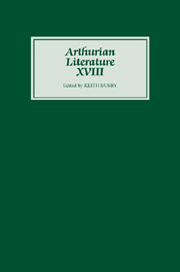Book contents
- Frontmatter
- Contents
- General Editor's Foreword
- I The Composition of the Tristran of Beroul
- II The Lure of the Hybrid: Tristan de Nanteuil, Chanson de Geste Arthurien?
- III L'Extrait du Roman d'Erec et Enide de La Curne de Sainte-Palaye
- IV ‘Talkyng of cronycles of kinges and of other polycyez’: Fifteenth-Century Miscellanies, the Brut and the Readership of Le Morte Darthur
- V Albine and Isabelle: Regicidal Queens and the Historical Imagination of the Anglo-Norman Prose Brut Chronicles
- VI Arthurian Literature, Art, and Film, 1995–1999
I - The Composition of the Tristran of Beroul
Published online by Cambridge University Press: 05 February 2013
- Frontmatter
- Contents
- General Editor's Foreword
- I The Composition of the Tristran of Beroul
- II The Lure of the Hybrid: Tristan de Nanteuil, Chanson de Geste Arthurien?
- III L'Extrait du Roman d'Erec et Enide de La Curne de Sainte-Palaye
- IV ‘Talkyng of cronycles of kinges and of other polycyez’: Fifteenth-Century Miscellanies, the Brut and the Readership of Le Morte Darthur
- V Albine and Isabelle: Regicidal Queens and the Historical Imagination of the Anglo-Norman Prose Brut Chronicles
- VI Arthurian Literature, Art, and Film, 1995–1999
Summary
Introduction
The Tristran ascribed to Beroul is one of the great narrative poems of French medieval literature. It is also one of the most controversial. The four and a half thousand lines of the extant fragment pose problems that have generated much heat and still, after more than a century of critical examination, remain stubbornly unresolved. The poem is preserved in a single manuscript of the second half of the thirteenth century and is incomplete, lacking both beginning and end, and it is unclear just how much is missing. Little is known of the author except that linguistic evidence suggests that he came from the south-west area of the langue d'oïl, probably Southern Normandy or Anjou. Possible influence of the Abelardian school of philosophy on the poet's outlook suggests a date as early as 1160, while some critics prefer a much later date, accepting that the expression in the manuscript le mal dagres should be emended to le mal d'Acre and see it as a reference to the illness suffered by the Crusaders during the siege of Acre in 1190 and 1191; a reference to Malpertis (the fox's lair in the Roman de Renart, composed 1176–7) which appears to offer a terminus ad quem of 1176–80, remains neutral, as the name almost certainly had a long history in popular literature. The very precise knowledge shown by the poet of places in Cornwall (Lancïen and Costentin among others) and his use of English words (lovendrant) and references to English persons and devices of English origin (Godoïne, the arc qui ne faut, a murderous contraption mentioned by Gaimar in his Estoire des Engleis) suggest an acquaintance with England.
- Type
- Chapter
- Information
- Arthurian Literature XVIII , pp. 1 - 76Publisher: Boydell & BrewerPrint publication year: 2001



